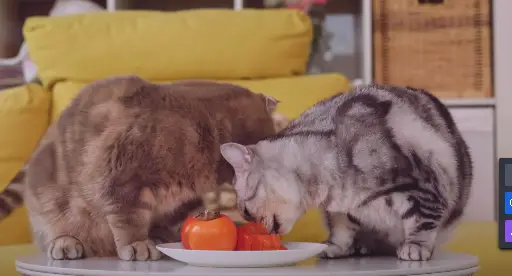
Table of Contents
Have you ever caught your feline friend eyeing your fruit bowl, particularly the vibrant, orange persimmons? It’s a common question among cat owners: Can cats eat persimmons?
This blog post delves into the world of cats and persimmons, exploring the potential health benefits, risks, and common questions surrounding this topic. Whether you’re a new cat owner or a seasoned pet parent, understanding what’s safe for your cat to eat is crucial. So, let’s unravel the mystery of cats and persimmons together.
As we know, persimmons are fruits that grow on deciduous trees native to China. There are two main varieties – Hachiya persimmons, which are acorn shaped with a pointed bottom, and Fuyu persimmons, which are shorter and squat like tomatoes.
Nutritional Value of Persimmons for Cats
So what nutrients do persimmons contain that might appeal to cats? Here is the nutrient breakdown for a typical medium sized Fuyu persimmon (around 168 grams):
- Calories: 127
- Carbohydrates: 31 grams
- Fiber: 6 grams
- Sugars: 21 grams
- Vitamin A: 55% RDI
- Vitamin C: 22% RDI
- Manganese: 55% RDI
- Potassium: 12% RDI
As you can see, persimmons contain high levels of beneficial vitamins A and C. They also provide a hefty dose of dietary fiber. In addition, persimmons offer antioxidants like beta-carotene and lycopene.
The main concern with feeding persimmons to cats is their sugar content. A medium persimmon contains around 21 grams of natural sugar. That’s a lot compared to most fruits. Too much sugar can cause gastrointestinal issues in cats.
So while persimmons contain useful nutrients for cats, their high sugar means they should only be fed occasionally and in moderation.
Health Benefits of Persimmons for Cats
Given their rich nutrient profile, persimmons can offer a few potential health benefits for cats:
Boost Immune System Health
The high levels of Vitamins A and C in persimmons can support immune function in cats. Vitamin A helps regulate immune responses, while Vitamin C promotes antibody production. A stronger immune system means a better ability to fight infections.
Improve Digestion
Persimmons contain significant amounts of dietary fiber – around 6 grams per fruit. Fiber helps promote healthy digestion and regularity. The manganese in persimmons also aids metabolism and nutrient absorption. Proper digestion is key for your cat utilizing nutrients from food.
Act as Antioxidants
Persimmons provide antioxidant compounds like beta-carotene, Vitamin C, and lycopene. Antioxidants help limit cell damage from free radicals and oxidative stress. This may support overall health and longevity.
While the vitamins, minerals, and antioxidants in persimmons can certainly benefit cats, their sugar content means they should only be an occasional treat.
Are Persimmons Safe for Cats to Eat?
Persimmons do contain several beneficial nutrients for cats. However, there are also some potential health risks of cats eating persimmons to consider:
Certainly! Let’s delve into the health risks associated with feeding persimmons to cats:
- High Sugar Content:
- Sugar Concerns: Persimmons are naturally sweet due to their sugar content. While a small amount of natural sugar is generally fine, excessive sugar intake can lead to gastrointestinal issues in cats.
- Recommendation: It’s best to feed ripe persimmons in very small quantities to avoid overloading your cat with sugar. Keep a close eye on your cat for any adverse reactions.
- Obstruction:
- Seeds in Persimmons: Persimmon flesh often contains small seeds. These seeds pose a choking risk, especially for cats, who tend to swallow food without much chewing.
- Precaution: Always check for seeds and remove them before offering persimmons to your cat.
- Allergic Reactions:
- Uncommon but Possible: Although allergic reactions to persimmons are less common, some cats may be sensitive to specific compounds found in the fruit.
- Signs of Allergy: Keep an eye out for symptoms like itching, skin redness, or gastrointestinal upset. If you notice any of these signs, it’s advisable to discontinue feeding persimmons.
- Safe Consumption Guidelines:
- Moderation: Cats can indeed eat persimmons, but it should be treated as an occasional treat rather than a regular part of their diet.
Remember to prioritize your cat’s health and well-being, and always consult with a veterinarian if you have any specific concerns about feeding certain foods to your feline friend! 🐾🍊
What Parts of a Persimmon Can Cats Eat?
When feeding persimmons to cats, it’s safest to only offer the ripe, soft flesh:
✅ Ripe Flesh
The soft pulp is the most palatable and safest part of the persimmon for cats. Scoop out the flesh away from any seeds.
❌ Seeds
Persimmon seeds pose a significant choking risk and provide no nutritional value. Make sure no seeds are present before feeding the flesh.
❌ Unripe Fruit
Unripe persimmons are very high in bitter tannins that can upset a cat’s stomach. Only feed soft, ripe persimmons.
❌ Plant Material
Do not allow cats to chew on other parts of the persimmon plant, like leaves or stems, as they may contain toxic compounds. Stick just to the edible ripe fruit.
For optimal safety, be sure to only feed your cat the soft, ripe, seedless inner flesh of the persimmons. Thoroughly check for any stray seeds or plant parts before serving.
How to Prepare Persimmons for Cats
When preparing persimmons for your cat, follow these steps:
- Select ripe, soft Fuyu persimmons – they have lower tannins than Hachiya.
- Rinse under cool water and pat dry.
- Slice persimmons in half lengthwise.
- Use a spoon to scoop the flesh away from the skin and seeds.
- Discard all seeds, skin, leaves and stems.
- Mash the ripe flesh lightly with a fork to make it easier for your cat to digest.
- Serve persimmon flesh in a small dish.
Be sure to only prepare one persimmon at a time to avoid waste if your cat does not like it. Refrigerate unused portions.
How Much Persimmon Can a Cat Eat?
When feeding this sweet, sugary fruit, it’s imperative to limit portion sizes. Here are some feeding guidelines:
For a small cat under 10 lbs:
- Maximum 1 teaspoon persimmon flesh per day
Medium cat 10-15 lbs:
- Maximum 2 teaspoons per day
Large cat over 15 lbs:
- Maximum 3 teaspoons per day
Since persimmons are high in natural sugars, excess consumption can cause digestive upset and diarrhea. Start with just a teaspoon for your cat’s first taste. Monitor them closely for any reactions.
Best Practices When Feeding Persimmons to Cats
If you want to share a few tasty persimmon treats with your cat, follow these best practices:
✅ Only feed ripe, seedless persimmon flesh
✅ Start with 1 teaspoon and gradually increase
✅ Limit to no more than 3 teaspoons for a large cat
✅ Monitor your cat closely afterwards for any reactions
✅ Discontinue use if any allergy symptoms appear
✅ Don’t allow access to leaves, stems or seeds
✅ Refrigerate unused portions immediately
As long as you take precautions, persimmons can be a nutritious occasional snack for cats. But they should not become a regular part of your cat’s diet due to their high sugar content.
Signs of a Persimmon Allergy in Cats
While not as common as some other fruits, persimmons may cause allergic reactions in some cats. Signs of an allergy can include:
- Itchy skin, rashes, or hives
- Swelling of the lips, eyes, ears or face
- Vomiting or diarrhea
- Wheezing, coughing or trouble breathing
If you notice any of these allergy symptoms after feeding your cat persimmons, stop giving them immediately. Seek veterinary attention if symptoms are severe or persist longer than 24 hours.
In most cases, persimmon allergies are not life-threatening. But it’s important to monitor your cat closely when first introducing new foods.
Are Persimmons Ultimately Safe for Cats?
While persimmons do contain beneficial nutrients, their high sugar content means they should only be an occasional treat for cats. The ripe, fleshy pulp is safe for cats to eat in small quantities. But be sure to remove all seeds first.
To safely share persimmons with your cat:
- Select ripe, soft Fuyu persimmons
- Scoop out just the flesh away from seeds/skin
- Start with 1 tsp and gradually increase
- Limit based on your cat’s size
- Refrigerate unused portions
- Monitor for any signs of an allergic reaction
Takeaway and Next Steps
In conclusion, persimmons can be a healthy treat for cats when given in moderation and with proper preparation. They offer hydration, fiber, and antioxidants that can benefit your cat’s health. However, it’s crucial to be aware of the potential risks and to monitor your cat’s reaction to this new addition to their diet. If you’re considering introducing persimmons to your cat’s treat repertoire, start with small amounts and permanently remove the seeds and skin. For any concerns or unusual behavior after consumption, consult your veterinarian.

Saira is the lead writer behind Cat Care Guide, a blog focused on providing cat owners with authoritative advice on feline health, nutrition, behavior, and more. As a zoologist specializing in microbiology and a dedicated cat owner for over 10 years, Saira combines her formal education, extensive research, and firsthand experience caring for cats into deeply researched blog content you can trust.
When she’s not working on new articles for Cat Care Guide, you can find Saira continuing to self-educate on the latest cat health developments, doting on her own cats at home, or volunteering at the local animal shelter. With a true passion for cat care and welfare, Saira’s mission is to help fellow cat lovers nurture happy, healthy lives for their feline companions.
Please feel free to reach out to Saira with any questions about caring for your cat! If needed, contact via the website contact form.
